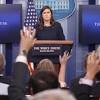Trump threatens to try and regain control of Panama Canal


President-elect Donald Trump has demanded Panama reduce fees on the Panama Canal or return it to US control, accusing the central American country of charging "exorbitant prices" to American shipping and naval vessels.
"The fees being charged by Panama are ridiculous, highly unfair," he told a crowd of supporters in Arizona on Sunday.
"This complete rip-off of our country will immediately stop," he said, referring to when he takes office next month.
His remarks prompted a quick rebuke from Panama's president, who said "every square metre" of the canal and surrounding area belong to his country.
President José Raúl Mulino added that Panama's sovereignty and independence were non-negotiable.
Trump made the comments to supporters of Turning Point USA, a conservative activist group that provided significant support to his 2024 election campaign.
It was a rare example of a US leader saying he could push a country to hand over territory - although he did not explain how he would do so - and a sign of how American foreign policy and diplomacy may shift once he enters the White House following his inauguration on 20 January.
Trump's comments followed a similar post a day earlier in which he said the Panama Canal was a "vital national asset" for the US.
If shipping rates are not lowered, Trump said on Sunday, "we will demand that the Panama Canal be returned to us, in full, quickly and without question".
The 51-mile (82km) Panama Canal cuts across the central American nation and is the main link between the Atlantic and Pacific oceans.
Up to 14,000 ships travel through it each year, including container ships carrying cars, natural gas and other goods, and military vessels.
It was built in the early 1900s. The US maintained control over the canal zone until 1977, when treaties gradually ceded the land back to Panama. After a period of joint control, Panama took sole control in 1999.
The US reserved the right to use military force in defence of the canal against any threat to its neutrality - a threat which now appears to be coming from the US itself.
The neutrality treaty guarantees fair access for all nations and non-discriminatory tolls. Different shipping companies do pay different amounts for passing through the canal - but this depends on the size of the ship and the load on board, not on the country of origin.
Canal transit costs have increased over the past year due to a historic drought, according to analysis by leading shipping industry website Lloyd's List.
Some 75% of the cargo passing through the waterway in the latest fiscal year was either destined for or originated from the US, according to the Panama Canal Authority.
However, the users of the canal are ship operators and owners, not countries themselves.
Trump hits the usual themes
As well as Panama, the president-elect also took aim at Canada and Mexico over what he called unfair trade practices. He accused them of allowing drugs and immigrants into the US, although he called Mexican President Claudia Sheinbaum a "wonderful woman".
Trump made his remarks in front of thousands at Turning Point's annual conference, one of the country's largest gatherings of conservative activists.
Turning Point poured huge resources into get-out-the-vote efforts in swing states designed to bolster Trump and other Republicans during the election campaign.
It was his first speech since a deal passed Congress this week to keep the US government open, after several provisions were removed including one that would have increased the country's debt ceiling.
Trump had supported raising the debt ceiling, which restricts the amount of money the US government can borrow.
But his speech on Sunday avoided that issue entirely, instead recapping his election victory and hitting on themes – including immigration, crime and foreign trade – that were mainstays of his campaign.
He did, however, mention Elon Musk.
"You know, they're on a new kick," he said. "All the different hoaxes. The new one is that President Trump has ceded the presidency to Elon Musk."
"No, no, that's not happening," he said. "He's not gonna be president."
Several speakers here at the conference were critical of government spending and of politicians in both parties – however the divisions inside the Republican Party which have played out in Congress in recent days were mostly muted.


 United Kingdom
United Kingdom Argentina
Argentina  Australia
Australia  Austria
Austria  Brazil
Brazil  Canada
Canada  Germany
Germany  Ireland
Ireland  Italy
Italy  Malaysia
Malaysia  Mexico
Mexico  New Zealand
New Zealand  Poland
Poland  South Africa
South Africa  United States
United States 


































